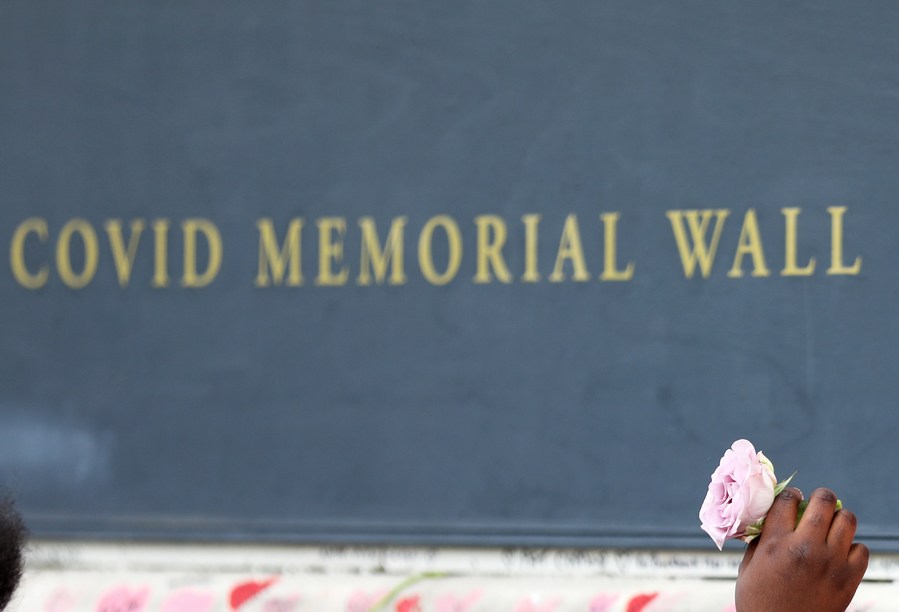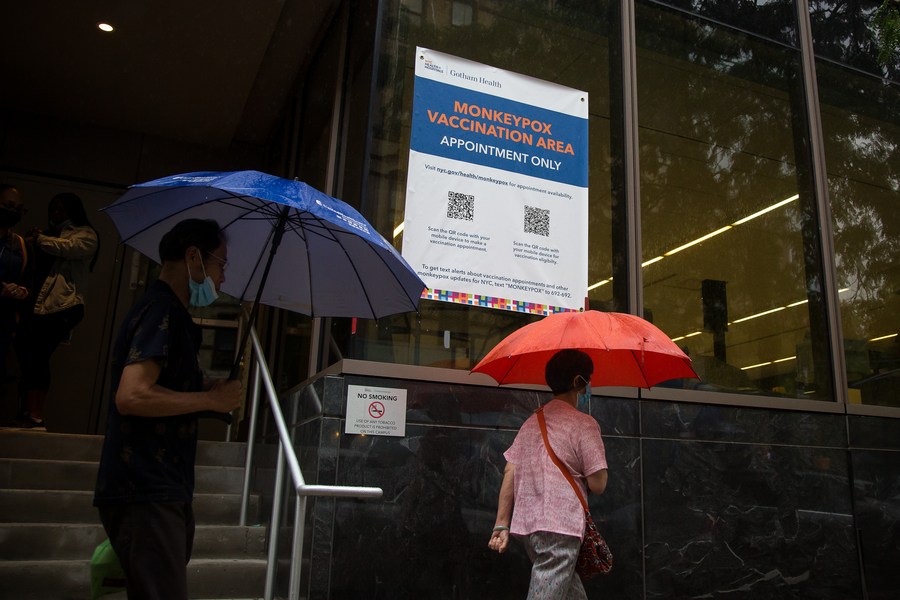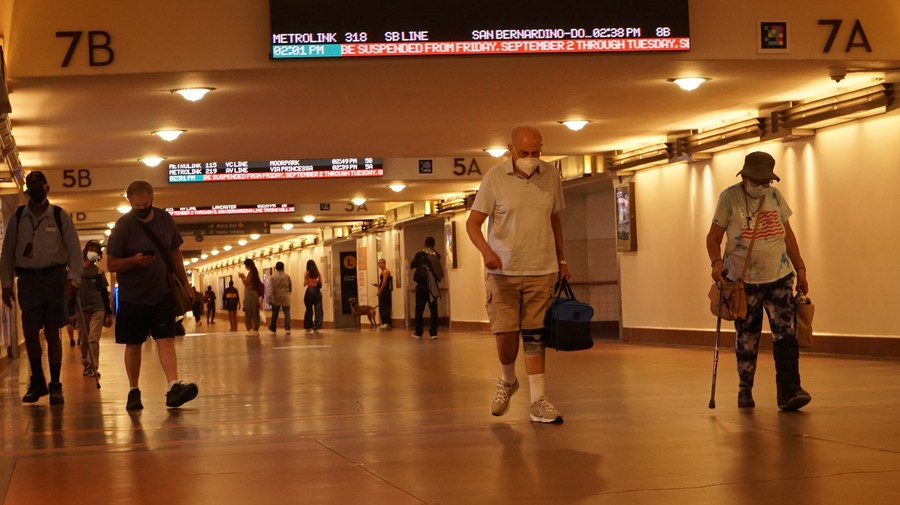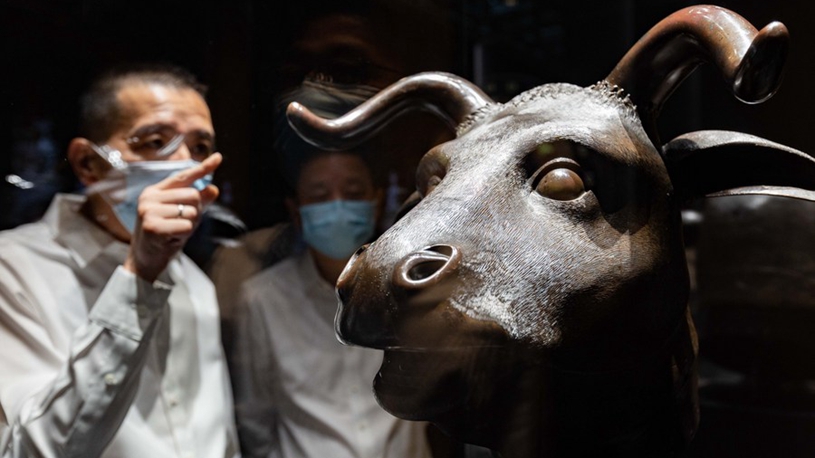* The end of the pandemic is still a long way off and downplaying the pandemic by some Western countries will have severe consequences.
* Across Western countries that have taken lax approaches to the pandemic and ended most restrictions, the pandemic outlooks are gloomy.
* The WHO has warned against complacency in fighting COVID-19, urging coordinated action and political commitments to saving lives and preventing economic and health damage by the ongoing pandemic.
BEIJING, Oct. 2 (Xinhua) -- Claims by some Western leaders that the COVID-19 pandemic "is over" has drawn criticism as the coronavirus continues to infect and kill people everyday across the world.
Such claims have also sparked warnings from health experts and observers, who have stressed that the end of the pandemic is still a long way off and that downplaying the pandemic by some Western countries will have severe consequences as new threats of long COVID and monkeypox are emerging.

A woman puts a flower on the National COVID Memorial Wall in London, Britain, March 27, 2022. (Xinhua/Li Ying)
PANDEMIC "NOT OVER"
While acknowledging that the United States still has "a problem with COVID," the White House said "the pandemic is over" in the United States, adding that "if you notice, no one's wearing masks. Everybody seems to be in pretty good shape."
In response to such comments, the Washington Post penned an editorial, writing straightforwardly that "the pandemic is surely not over."
"The pandemic is still raging -- in the sense that a dangerous virus is infecting, sickening and killing people, mutating to survive and haunting the globe," the article wrote. "The pandemic has shifted -- and normalcy has returned in many ways -- but it is not over."
The seven-day moving average of new COVID-19 deaths in the United States is about 325 while more than 47,000 infections have been reported each day, according to the latest COVID data tracker weekly review released by the Centers for Disease Control and Prevention (CDC).
In total, the United States has seen over 96 million COVID-19 cases and more than 1 million related deaths. Both numbers remain the highest in the world.

U.S. national flags fly at half-staff at the Washington Monument to mourn 1 million American lives lost to COVID-19 in Washington, D.C., the United States, May 12, 2022. (Xinhua/Liu Jie)
Across other Western countries that have taken lax approaches to the pandemic and ended most restrictions, the pandemic outlooks are also gloomy.
"One of the problems we have in the UK, of course, is all restrictions have been removed and people are assuming, as a consequence, that we're out of the pandemic, and there's been some very mixed messaging from government, including messages that somehow we're in a post-pandemic situation when we're clearly not," said Lawrence Young, a virologist and a professor of molecular oncology at the University of Warwick in Britain.
British health experts on Wednesday warned that increased circulation of flu and a resurgence in COVID-19 could lead to a difficult winter that increases pressure on the already stretched National Health Service, said a Reuters report.
In France, during the week ending Sept. 25, there had been 358 confirmed COVID cases for every 100,000 people, up 22 percent from the previous week, representing an average of around 34,700 new cases per day, according to the latest data from the public health agency Sante Publique France.
DISASTROUS CONSEQUENCES
While the Western governments are trying to downplay the pandemic, the severe consequences of their failure in handling the disease are becoming increasingly apparent.
Due to COVID-19, the average life expectancy of Americans fell in 2020 and 2021, the sharpest two-year decline in nearly a century, according to a report published by the CDC in late August.
Besides, the virus has become the third-leading cause of death in the United States after heart disease and cancer, said the CDC.
Meanwhile, reports of people contracting and re-contracting COVID-19 as well as experiencing side effects in one way or another have pointed to the long-term physical fallout from coronavirus infection, known as "long COVID," which is largely underestimated.
COVID is not a single condition but rather "a wide range of new, returning, or ongoing health problems that people experience after first being infected with the virus that causes COVID-19," according to the CDC.
People with post-COVID conditions may experience physical and mental health problems of different types and combinations of symptoms happening over different lengths of time, including malaise, fatigue, breathing challenges, cardiovascular abnormalities, migraines, depression and anxiety, among other conditions.
In the United States, for instance, long COVID has been described as the "next national health disaster" and the "pandemic after the pandemic," the Kaiser Family Foundation, a U.S.-based health research organization, said in a policy watch piece in August.
In the World Health Organization (WHO) European Region, at least 17 million people experienced long COVID in the first two years of the pandemic, and millions may have to live with it for years to come, said an article published on Sept. 13 by WHO.
"The pandemic isn't over, but will continue to resonate for months to come," Brookings Institution Senior Fellow Darrell West told Xinhua. "Long COVID will have an impact on the labor force because it will push some people into long-term care issues and keep them out of the workforce."
In addition to concerns over the long COVID, the worry that Western governments may repeat their mistakes in containing the emerging threat of monkeypox is on the rise, especially in the United States, where over 25,000 monkeypox cases have been reported.
"From vaccinations to communications, the White House effort to fight the monkeypox virus has been one mess after another," said a recent report of Bloomberg.

Pedestrians walk past a monkeypox vaccination site in New York, the United States, on Sept. 6, 2022. (Photo by Michael Nagle/Xinhua)
VIGILANCE URGED
The assertion that the COVID-19 pandemic is over is both "reckless" and "irresponsible," Steven Thrasher, a journalism professor at Northwestern University, tweeted.
Thrasher also expressed concern that many businesses, state and local governments, non-profits and educational institutions across the United States would "end all attempts at mitigation, support, and care" as a result of the remark.
Lawrence Gostin, director of the O'Neill Institute for National and Global Health Law and professor at Georgetown Law, tweeted that he is worried that members of the public may relax masking and even delay getting vaccinated.
"As we move to respiratory virus season & launch a vaccine campaign, we must urge vigilance," Gostin said.
The WHO has warned against complacency in fighting COVID-19, urging coordinated action and political commitments to saving lives and preventing economic and health damage by the ongoing pandemic.
The organization also noted that the pandemic is still inflicting a death toll of 10,000 per week, most of which could be prevented, while large vaccination gaps exist especially in low- and middle-income countries.
"That means everyone needs to use, when needed, the simple tools that are available to stay safe: distancing, masks and ventilation. And it means everyone needs access to the medical tools to stay safe: vaccines, tests and treatments," WHO Director-General Tedros Adhanom Ghebreyesus said.

People wearing face masks are seen at L.A. union station in Los Angeles, California, the United States, on Aug. 5, 2022. (Xinhua)
Richer nations must not step back from tackling COVID-19 as a global problem now, ahead of future potential waves of infection, Bruce Aylward, WHO senior adviser, warned.
Countries need to be ready and have treatments in place for any further waves of infection, and "if you go to sleep right now and this wave hits us in three months ... God -- blood on your hands," Aylward was quoted as saying in a recent report by Reuters. (Video reporters: Xia Lin, Zhang Mocheng, Tan Jingjing, Zhao Xiaona, Guo Shuang, Larry Neild, Li Cheng, James Asande, Zack; video editors: Li Ziwei, Zhu Jianhui, Wu Yao, Liu Xiaorui)■












